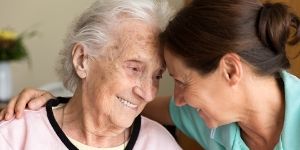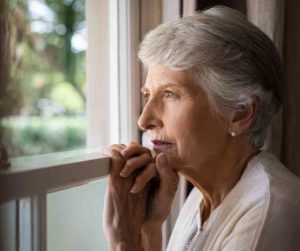Tips, Resources & Support for Holiday Season During COVID-19

This time of year is usually full of eager anticipation, cheerful gatherings, acts of kindness and charitable giving. Like so many aspects of life, this year the holiday season will look different than ones that came before. While we will all have to continue to be creative in how and where we gather with family and friends, observe holiday traditions, and participate in the season, we can still make this year meaningful and special.
Coping with Separation & Loss During Celebrations
Do you or your families need a refresher on Zoom? Don’t let anyone feel left out of the virtual celebration, share our step by step Zoom Guide.
Consider a drive-by potluck dinner. If you can’t bring yourself to reduce the recipe of your favorite holiday dish, coordinate with loved ones who may be within driving distance and organize a drop-off potluck. Make the full holiday serving size, divvy up into individual portions, and make a no-contact delivery to loved ones who are close by. OR, if you are far apart from loved ones, especially elderly family members, consider ordering them a prepared meal to be delivered.
Find more tips like this in…
Remember, this year, safety is most important to ensure future holidays celebrations can be shared together in person. Review the CDC Guidelines and Recommendations for Thanksgiving & upcoming holidays.
If you are a caregiver, this holiday can be extra difficult managing the stress of your role in the midst of the pandemic, and without the extra family support during this season. We are here for caregivers.
If you have experienced loss this year, this difficult and distanced holiday time can feel especially challenging to navigate.
- For those of the Jewish faith, join us on December 9 for a special program “Light in the Midst of Darkness: Chanukah in the time of COVID for the Bereaved” Register in advance (fee $10)
Additional resources for the bereaved:
Time for Traditions
Practice gratitude. Here are a number of resources for nurturing gratitude for Thanksgiving and beyond.
Find comfort in the familiar of tradition. Put out the special tableware, the traditional recipes, and find religious services streaming online.
Embrace the nostalgia of the hand-written card. When we are all missing family and friends more than ever, a hand-written (or even hand-made if you want to avoid the stores) card can mean so much to the recipient.
Dress up! Even if you are hosting a smaller gathering than usual, or celebrating solo, dress up in your formal holiday attire. Wearing your holiday best can bring about the celebratory spirit!
Missing out on the cookie baking marathon with your loved ones? Set up a video call and bake “together.” This can be a special opportunity to record your family members passing down beloved family recipes which can be cherished for generations.
Find more tips like this in…
Community Event: Interfaith Thanksgiving Service dedicated in memory of Rabbi Feldman
Thurs, November 26 @ 11:00 AM
Join for a special interfaith service for the holiday. STREAM LIVE
Make this time Special with Service
This has been a challenging year for many – job loss, food insecurity, seniors feeling especially isolated. In this season of giving, find ways to make a difference in your community…
Participate or lead a Thanksgiving/Holiday Food Drive. Check with local pantries if they are collecting specific items for the upcoming holidays or if they are in need of pantry staples.
- Want to support JFCS pantry clients? Contact us: BethE@jfcsonline.org / 609-987-8100 Ext 126.
Want to get out into the community? Food banks, food pantries and soup kitchens continue to see rising demand. Reach out to organizations in your area and inquire about volunteer opportunities. Many organizations are relying on volunteers to facilitate large-scale grab and go meal distributions.
- Help at JFCS! We welcome volunteers to help pack prepared bags of food for our on-site and mobile food pantries. Contact us: BethE@jfcsonline.org / 609-987-8100 Ext 126.
Share a smile with a senior. The restrictions of current quarantine orders dramatically impact older adults. Consider making holiday cards to be shared with isolated seniors. Reach out to local senior care facilities or organizations to inquire about how to best distribute holiday greeting cards to their residents/clients.
- JFCS is collecting cards for our senior clients which will be distributed to those who receive delivered meals and food. Contact Eden Aaronson to learn more: EdenA@jfcsonline.org / 609-987-8100 Ext 113.
Make a donation. Find an organization close to your heart and make a gift that is meaningful to you to support them. Share with family and friends why this cause is important and encourage them to do the same.
- You can help make the holidays special for JFCS clients by donating gift cards to our L.I.G.H.T.S (Love is Getting Holidays Gifts to Share) program. Learn more here.
- By making a general monetary donation to JFCS, you are enabled us to continue our vital support to the community through our food pantries, senior support and mental health care. Make a donation today.
Embrace the Opportunity for NEW Traditions
Never had time to make a Turkey Trot before now? Most charity walks/races have gone virtual and can be completed from anywhere! Make a team with family and friends no matter how distanced you are, and embrace the chance to create a new tradition with them.
- You can participate in the Mercer County Turkey Trot Nov 21 – 28! Proceeds help support Mercer County food pantries including JFCS. Sign up today!
Create a Secret “Snowflake” gift exchange through the magic of Amazon Prime (or any online store). Organize a gift exchange through a broad network using social media or keep it to a close-knit group with whom you may not be able to gather in person with this year.
Seek out virtual holiday concert or performances, coordinate virtual “watch parties” of your favorite holiday movies with your loved ones, enjoy outdoor, socially distanced opportunities like drive-through or walk-through light displays, and explore local opportunities like Palmer Square holiday weekends or Morven Museum & Garden Festival of Trees.
This Thanksgiving, enjoy an Interfaith Service, dedicated to the memory of Rabbi Adam Feldman. Stream the program live, Thursday, November 26 at 11 AM.
Festive Foods
See a guided video by our very own Andrea Gaynor to make your own Sufganiyot (Jelly Doughnuts) for Hanukkah!
Our registered dietitan has shared tips and recipes for budget-friendly and time-conscious Thanksgiving dishes.
Check out additional family friendly recipes:
Games & Crafts
Get crafty and creative this holiday season with these activities fun for all ages!
- Holiday Family Fued (make teams and play over Zoom!)
- Thanksgiving Gratitude Game
- Thanksgiving Movies (set up a virtual watch party for loved ones near & far!)
- DIY Mason Jar Luminaries for your holiday table
- Mason Jar Leaf Luminaries
- Make Your Own Hanukkah Candles
- Origami Paper Dreidal
- DIY Menorahs
- Hanukkah Family Game Night – ideas for all 8 nights!
- Gift Wrapping Tips
Do What Works Best for YOU and Your Mental Health
It has been said that during the pandemic, sometimes it takes more effort to accomplish less. The emotional and mental toll of the past months may leave many feeling exceptionally fatigued by the holidays before they have even arrived.
If you need to keep things simple to protect your mental health, then take the time for self-care. If you’re feeling over-Zoomed before weeks of virtual holiday drinks, be honest with your family and friends and let them know you cannot join all of the engagements.
Find information & tips in our blogs:
- Practicing Self-Care
- Supporting Those Around You, AND Caring For Yourself
- A Reflection on “Making the Most of Your Time”
- Review breathing & mindfulness exercises (VIDEO)
- Understanding your feelings of grief for the “loss of normal” (VIDEO)
And, if you need to talk to someone, reach out to JFCS…
- During our Drop-in Hours (Mon, Wed, Fri 10 AM – 12 PM or Tues, Thurs 5 – 7 PM) call 609-987-8100 Dial 0
- Connect with our intake coordinator for ongoing counseling at 609-987-8100 Ext 102

 During the COVID-19 pandemic, many organizations, communities, and families have turned to Zoom as a way to connect virtually while remaining socially distant. But joining Zoom calls can be complicated and time-consuming, which discourages us from socializing with relatives and friends. These instructions can help you to join Zoom calls using a computer, a smartphone, or a regular cell phone so that you don’t miss out on virtual social gatherings.
During the COVID-19 pandemic, many organizations, communities, and families have turned to Zoom as a way to connect virtually while remaining socially distant. But joining Zoom calls can be complicated and time-consuming, which discourages us from socializing with relatives and friends. These instructions can help you to join Zoom calls using a computer, a smartphone, or a regular cell phone so that you don’t miss out on virtual social gatherings.



 The phrase “social distancing,” the action needed to reduce the risk of exposure to an illness or virus, has now become part of our vernacular. We’re advised to maintain a distance of 6 feet from others, avoid being in crowded areas (i.e., avoid shopping when stores are busy or use “senior” hours to shop), wash our hands for 20 seconds or longer both before and after an array of activities, and use online grocery service. While all this is meant to safeguard us as best as possible, we have become isolated out of necessity and safety.
The phrase “social distancing,” the action needed to reduce the risk of exposure to an illness or virus, has now become part of our vernacular. We’re advised to maintain a distance of 6 feet from others, avoid being in crowded areas (i.e., avoid shopping when stores are busy or use “senior” hours to shop), wash our hands for 20 seconds or longer both before and after an array of activities, and use online grocery service. While all this is meant to safeguard us as best as possible, we have become isolated out of necessity and safety. We are all dealing with grief now—loss of normalcy; loss of connection; fear of economic toll, nervous anticipation of the future. For those in our community who are mourning the loss of a loved one, the grief is intense and even more isolating because we do not have the traditional community supports to provide some sense of stability. As holiday times approach, the Empty Chair has become the Empty Table and the Empty Room. What are some tools that can give you the support you need?
We are all dealing with grief now—loss of normalcy; loss of connection; fear of economic toll, nervous anticipation of the future. For those in our community who are mourning the loss of a loved one, the grief is intense and even more isolating because we do not have the traditional community supports to provide some sense of stability. As holiday times approach, the Empty Chair has become the Empty Table and the Empty Room. What are some tools that can give you the support you need?